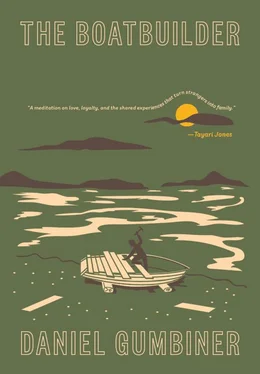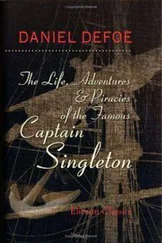One day, when Berg was caulking the Alma, a reporter came into the shop. He said he was looking for Alejandro and Berg told him that Alejandro was out by the mouth fishing for herring. It was November and the herring run stretched from one end of the bay to the other, a forty-foot-wide river of shimmering silver.
“Do you know when he’ll be back?”
“I don’t.”
“No idea at all?”
Berg yelled over to Uffa, who was at the other end of the shop, cutting blocks for the Alma and soaking them in linseed oil. He said he didn’t know either.
“I’m sorry,” Berg said to the reporter. “We don’t know when he’ll be back.”
“I want to ask him about Szerbiak,” the reporter said. “I drove all the way out here.” He was wearing a dress shirt and glasses and he had a sweater tied around his neck.
“The novelist?” Berg asked.
“Yes, of course the novelist,” the man said, irritated.
“I’m sorry,” Berg said. “If you leave your name and number, I’ll pass it to him.”
When Alejandro came home, Berg told him about the man who had stopped by. Alejandro seemed disturbed, wanted to know what the man looked like. Berg described him, and then he asked Alejandro if he’d known Szerbiak.
“I went to college with him,” Alejandro replied.
“That’s so cool. His work is amazing.”
“It was cool for a while but I’m done with that scene. It was a dead end. The whole scene was a dead end.” He picked up a wooden mallet and began to caulk alongside Berg. “If that man comes back,” he said, “tell him I don’t live here.”
WINTER IN TALINAS WAS a great reawakening. The heavy rains brought out the ferns and the mosses, and the fruit orchards stood knee-deep in grass. In the hills the wild mustard grew tall and yellow, and the bees emerged from their cells to pollinate the buttercups. Around the bay, the trails became so overgrown that you felt, when you walked along them, as if you were wading through a shallow pool.
During winter, Alejandro heated the shop with two wood stoves, which he fed with scrap wood from their boat projects. He had connected a pipe to one of the wood stoves and run it to the shop bathroom, which allowed them to have steam showers. While most of his work came from JC, whom Berg had still not met, Alejandro also did some repair work and took commissions from other people in town, usually for small boats, dories or canoes. That fall, for example, they replaced several planks on a fishing boat and they also repaired Vespucci’s canoe.
Alejandro helped out on the farm, too, but that was primarily Rebecca’s domain. She ran the whole thing herself, growing vegetables and raising cows, goats, and chickens. Her gardens were colorful and overflowing. There were medicinal herbs and native grasses, as well as a wide variety of produce. Green beans and chilies and Zucchinis. Acorn squash and yellow squash and winter squash. She liked squash.
Rebecca had grown up in Santa Margarita, down south. She was a strong, solid woman, her skin dark from days in the sun. She dressed simply, in jeans and white shirts that she sewed herself. Her glasses were round and thick and, as far as Berg could tell, she never lied. She was a born farmer, had thousands of different projects all over the property. But of all her labors, she seemed to take most joy in caring for the animals. And of all the animals, she seemed to like the geese best.
Her granddaughter, Tess, was also enamored with the geese. Apparently, last year, one of the geese had given birth to goslings, whom Tess had been permitted to adore for several days before they were sold off, to her dismay. This subject came up often around the house and Berg could tell that, for Tess, the loss of the goslings had been a great tragedy.
Tess was six years old. She was something of a feral child, spending every day outdoors, hunting lizards and climbing trees and building small dams out of rocks and sticks. Like her grandfather, she was highly inquisitive. She was always asking questions, always trying to solve some new puzzle. Her uncles, Sandy and Hal, liked to take her out in the little dhow that they’d built. They called it the Wildcat, and they’d often sail it over to Horse Island, pretending, with Tess, that they were explorers discovering the bay for the first time.
Sandy and Hal spent their days at school, but when they came home, they helped out around the farm, or looked after Tess. Whenever Berg spoke with them, they were always in a good mood: bright, mannerly teenagers, at peace with their place in the world. They understood that their life was not a common one, but it did not trouble them. They were proud to be Vegas, proud to go to school as representatives of that strange family that lived off the 1 and wore funny handmade clothes.
One night, Nell and Berg had dinner with Alejandro’s whole family and a couple of their friends from town, Morty Weisenstein, the WMUR radio talk show host, and his partner, Jacob, who was a professor at a state university. Uffa didn’t join them. He was out on a date with a girl he’d just started seeing, Demeter.
After their meal, the dinner party walked over to the shop to inspect the Alma. The boat was nearing completion, would soon be ready for its launch. Morty commented on the beauty of the boat’s transom and Alejandro explained that its dimensions were very similar to another boat he’d designed.
“It’s right up here in the rafters, actually,” he said.
Using a block and tackle, Alejandro lowered the boat so they could inspect it. The transom did resemble Alma ’s: it was slanted and curved, cut from pepperwood. This boat was significantly smaller, however, with a bold sheer and a high bow. It was called the Coot.
“Uffa built one of these boats himself,” Alejandro explained. “Took him a whole year. But then he and his friends had this idea to stage a Viking funeral as some kind of art project.”
“No, Ale,” Rebecca said, “it was for a scene in a movie. They were making a short film.”
“Oh, that’s right,” Alejandro said. “Well, in any case, they filled the boat with straw and set it on fire, out on the bay.”
“Isn’t that illegal?” Jacob asked.
“Yes,” Alejandro said. “Uffa does insane things like this every once a while.”
“He has an artistic sensibility,” Rebecca said.
Berg circled the Coot. He wanted so badly to be able to build something that beautiful, but he wasn’t even close. Alejandro had first started working an adze in Tahiti—standing in gallon buckets to protect his legs from stray cuts—when he was eight years old. Berg wanted to be exactly like him, to possess his skill and patience and calm self-reliance. But they were fundamentally different people, with different minds and different backgrounds, and every once in a while, as Berg was striving to understand what Alejandro understood, the vast gulf between the two of them became vividly clear, and a great, quiet pain rose up in him. He would never be Alejandro. So what was he trying to become?
The dinner party hung around the shop for a while, drinking wine, and then Berg and Nell walked home. Back at Mimi’s, Berg made a pot of tea and brought it into the living room. Nell was leaning against the far wall, across from the desk, stretching her calves. She was always stretching at unusual times, in unusual places.
“That isn’t caffeinated, is it?” Nell asked.
“No.”
“The other night I went out for Chinese food and I was just gulping down all this tea, not realizing it was caffeinated, and it kept me up until 4 a.m. For a while I kept trying to fall asleep but then I was just like, okay, this isn’t happening, and I went into the living room and read all these letters by my great aunt that I’d been meaning to look through. Her father was a private investigator in New York. Have I ever told you that? I didn’t really find anything in the letters yet. It’s mostly just gossip. Like, ‘Did you see the rakish angle of Eleanor’s hat at the races last week?’ That kind of thing.”
Читать дальше












